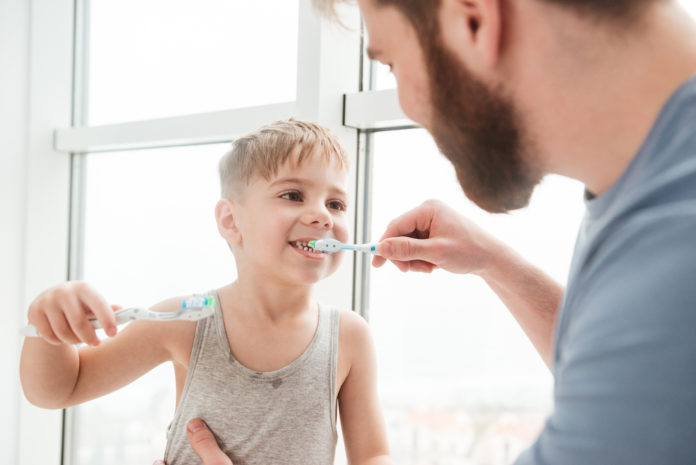Periodontal disease in children and adolescents is generally rare. However, children should still learn the importance of keeping their teeth and gums healthy to prevent periodontal disease in the future.
Children should brush their teeth twice a day and learn how to floss properly- if children learn how to floss at an early age, they will be more likely to make it a lifetime habit. These two simple acts will help protect their teeth and gums from periodontal disease.
As a parent, you should also be aware of the warning signs of periodontal disease, which include red, swollen, bleeding gums or bad breath that won’t go away. If your child develops any of these symptoms, tell your dental professional right away.
Types of Periodontal Diseases in Children
Chronic gingivitis is common in children. It usually causes gum tissue to swell, turn red and bleed easily. Gingivitis is both preventable and treatable with a regular routine of brushing, flossing and professional dental care. However, left untreated, it can eventually advance to more serious forms of periodontal disease.
Aggressive periodontitis can affect young people who are otherwise healthy. Localized aggressive periodontitis is found in teenagers and young adults and mainly affects the first molars and incisors. It is characterized by the severe loss of alveolar bone, and ironically, patients generally form very little dental plaque or calculus.
Generalized aggressive periodontitis may begin around puberty and involve the entire mouth. It is marked by inflammation of the gums and heavy accumulations of plaque and calculus. Eventually it can cause the teeth to become loose.
Signs of Periodontal Disease
Four basic signs will alert you to periodontal disease in your child. Bleeding gums during tooth brushing, flossing or any other time; swollen and bright red gums; gums that have receded away from the teeth, sometimes exposing the roots; and constant bad breath that does not clear up with brushing and flossing.
Adolescence
Hormonal changes related to puberty can put teens at greater risk for getting periodontal disease. An increased level of progesterone and possibly estrogen, cause increased blood circulation to the gums. This may increase in the gum’s sensitivity and lead to a greater reaction to any irritation, including food particles and plaque, and the gums may become swollen, turn red and feel tender.
As a teen progresses through puberty, the tendency for the gums to swell in response to irritants will lessen. However, it is very important to follow a good at-home dental hygiene regimen, including regular brushing and flossing, and regular dental care.
Advice for Parents
Early diagnosis is important for successful treatment of periodontal diseases. Therefore, it is important that children receive a comprehensive periodontal examination as part of their routine dental visits. Be aware that if your child has an advanced form of periodontal disease, this may be an early sign of systemic disease. A general medical evaluation should be considered for children who exhibit severe periodontitis.
The most important preventive step against periodontal disease is to establish good oral health habits. Follow these basic preventive steps to help your child maintain good oral health:
- Establish good dental hygiene habits early. When your child is 12 months old, you can begin using toothpaste when brushing his or her teeth. When the gaps between your child’s teeth close, it’s important to start flossing.
- Serve as a good role model by practicing good dental hygiene habits yourself.
- Schedule regular dental visits for family checkups, periodontal evaluations and cleanings.
- Check your child’s mouth for the signs of periodontal disease, including bleeding gums, swollen and bright red gums, gums that are receding away from the teeth and bad breath.
Courtesy of the American Academy of Periodontology; visit www.perio.org for more information.
To schedule an appointment with Dr. Karl Smith at his dental offices in Waldorf or Alexandria please call (301) 638-4867 or (703) 894-4867.











